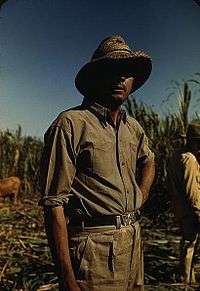Jíbaro
| Jíbaro | |
|---|---|
|
Monumento al Jíbaro Puertorriqueño dedicated to the Jíbaro, in Salinas, Puerto Rico. | |
| Nationality | Puerto Rican |
| Occupation | Agricultural land tenants, sharecroppers, fieldworkers |
| Religion | Catholic, some Protestant |
Jíbaro is a term commonly used in Puerto Rico, as well as other Latin American countries, to refer to mountain-dwelling peasants,[1] but in modern times it has gained a broader and, specifically, a nobler, cultural meaning.[2]
History

In Puerto Rico, the Jíbaro culture has its origins primarily in Canarian culture, with minor influences from the native Taíno culture. The term jíbaro usually refers to "La Gente de la Montaña" (the people of the interior mountainous regions of Puerto Rico) and emerged in the 16th century with the blending of the Pre-Columbian Taíno and Spanish European cultures in the central mountains of the island. Royal Spanish Academy of Language or "Real Academia Española" says that the word originates from mountain people of central castile. Many of these early Spanish settlers preferred to settle in mountainous terrain that they were accustomed to back on the Spanish mainland and later from the Canary Islands. Some elements of the jíbaro culture are still visible today. For example, when Luis Muñoz Marín founded the Popular Democratic Party (PDP) in 1938, the party adopted the jíbaro hat, the pava, as its symbol. The PDP seal shows the pava with the words Pan, Tierra, y Libertad ("Bread, Land, and Freedom"). Also, every Christmas, Puerto Ricans use the Jíbaro instruments, music, and cuisine to celebrate these festivities.

The first known use of the word "jíbaro" occurred in 1814 in Diario Económico de Puerto Rico. In that paper there is a letter to the editor dated 17 June 1814 signed by “El Gíbaro Paciente” (The Patient Jíbaro). It is used in the context of an indigenous Puerto Rican character.[3]
Modern usage of the word
Since at least the 1920s[4] the term "jíbaro" has a more positive connotation in Puerto Rican culture, proudly associated with a cultural ideology as tough pioneers of Puerto Rico.[5]
However, the term occasionally also has a negative connotation. A jíbaro can mean someone who is considered ignorant or impressionable due to a lack of a more European style of education as is many country or "hill billy" people of many other cultures. Despite this negative connotation, the image of the jíbaro represents an ideology of a traditional Puerto Rican: hard-working, simple, independent, and prudently wise.[6]
Colloquially, the jíbaro imagery serves as a representation of the roots of the modern day Puerto Rican people and symbolizes the strength of such traditional values as living simply and properly caring for homeland and family.[6]
Uses of the word in other countries
- In Cuba there exists a word similar to jíbaro, Guajiro. In Cuba and the Dominican Republic a jíbaro can also refer to a runaway dog.[1]
- In Colombia, Brazil and Venezuela Xivaro, or Gibaro, which is pronounced similar to jíbaro, was a name given to the mountain natives of mentioned countries by the Spaniards and Portuguese.[7]
- In Ecuador, givaro is the indomitable indigenous or country persons that is endlessly elusive to the white man.[1]
- In Peru, the word jíbaro refers to country or mountain inhabitants.
- In the 18th century Mexico, a jíbaro was a fable of a child born of a lobo (Wolf) and a china (Chinese), actually that is the child of a mixed-race father (the son of an indigenous man and a black woman) and a mixed-race mother (the daughter of a white man and an indigenous woman).[1]
Further reading
- El Jibaro. Puerto Rico Off The Beaten Path. Page 157. Accessed January 16, 2011.
Notes and references
- 1 2 3 4 Enrique Vivoni Farage and Sylvia Álvarez Curbelo. Hispanofilia: Arquitectura y Vida en Puerto Rico, 1900–1950. San Juan, Puerto Rico: Editorial de la Universidad de Puerto Rico. 1998. Page 258. ISBN 0-8477-0252-9.
- ↑ Tijana Ilich. Puerto Rican Music – Jíbaro Music – Seis, Aguinaldo, Bomba, Plena. About.com
- ↑ El Silenciamiento del Sujeto de Origen Africano en las Letras Puertorriqueñas del Siglo XIX. Rosita E. Villagómez. Florida State University. School of Arts and Sciences. Ph.D. dissertation. Department of Modern Languages and Linguistics. Summer 2005. Page 46. Retrieved 25 July 2012.
- ↑ Puerto Rico, Antonio Paoli y España: Aclaraciones y Críticas. Néstor Murray-Irizarry. Footnote #26 (José A. Romeu, "Recordando noches de gloria con el insigne tenor Paoli", El Mundo, 31 de noviembre de 1939. p. 13) Ponce, Puerto Rico. Retrieved 27 April 2013.
- ↑ ¡Un agricultor de nueve años de edad! Carmen Cila Rodríguez. La Perla del Sur. Ponce, Puerto Rico. 27 July 2011. Retrieved 12 October 2011.
- 1 2 ¡Un agricultor de nueve años de edad!: Carlos Emanuel Guzmán, un jíbaro de nueva estirpe. Carmen Cila Rodríguez. La Perla del Sur. Ponce, Puerto Rico. Year 29, Issue 1443. 27 July 2011. Page 6. Retrieved 4 November 2011.
- ↑ Maurizio Gnerre. Jivaroan linguistic and cultural tradition: an Amazonian-Andean sedimentation (Word Document). Università degli Studi di Pavi
